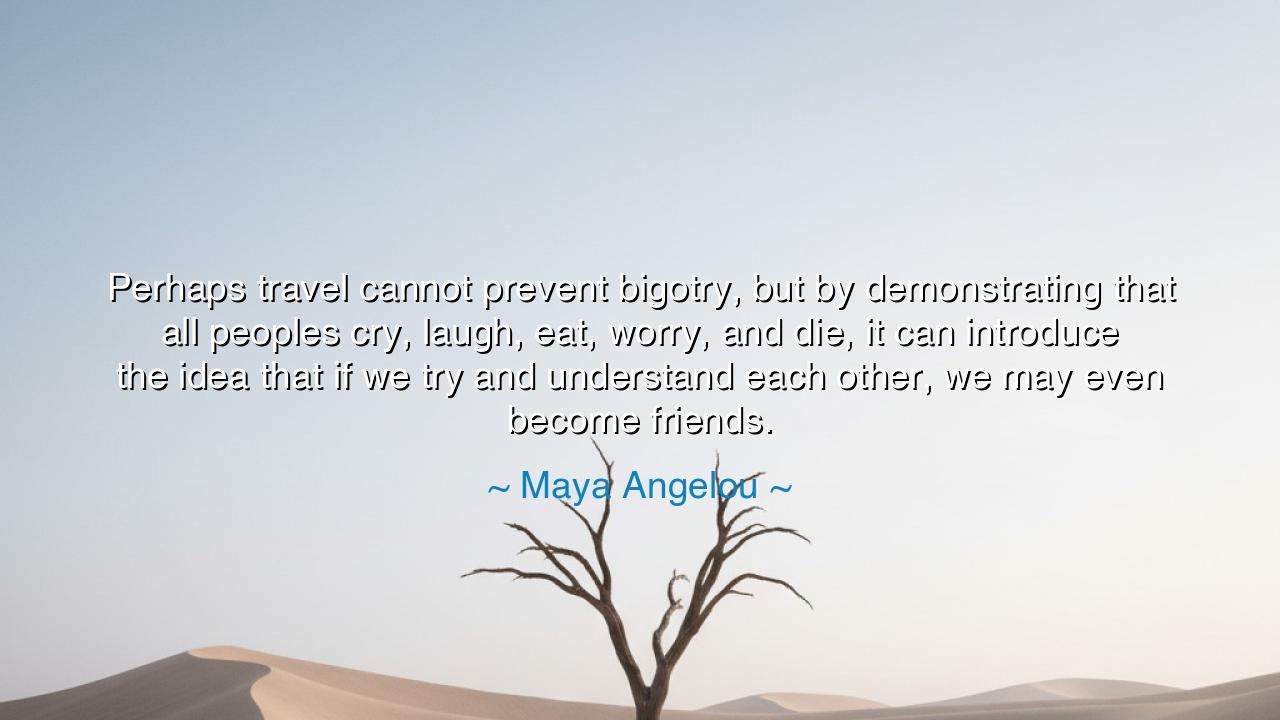
Perhaps travel cannot prevent bigotry, but by demonstrating that
Perhaps travel cannot prevent bigotry, but by demonstrating that all peoples cry, laugh, eat, worry, and die, it can introduce the idea that if we try and understand each other, we may even become friends.






The poet and sage Maya Angelou, whose words often shone like lamps in the darkness of human division, once declared: “Perhaps travel cannot prevent bigotry, but by demonstrating that all peoples cry, laugh, eat, worry, and die, it can introduce the idea that if we try and understand each other, we may even become friends.” This is no idle phrase but a truth carved from the bedrock of human experience. It acknowledges that hatred cannot be erased by distance alone, but it can be softened, even undone, by the recognition of our shared humanity.
Her words begin with humility: “Perhaps travel cannot prevent bigotry.” For she does not dress travel in illusions of perfection. She knows that prejudice is deep, seeded in fear and ignorance. Yet she proclaims that travel has the power to open the eyes and ears, to awaken hearts long closed. When one leaves the narrow boundaries of their homeland, they are forced to see not an “other” but a reflection of themselves—different in clothing and tongue, yet alike in hunger, in grief, in joy, and in mortality.
The heart of her teaching lies in the litany: “cry, laugh, eat, worry, and die.” These are the threads that weave every soul into the same fabric of existence. Kings and beggars alike shed tears. The merchant in Cairo, the farmer in China, the mother in Brazil—all know laughter, all hunger for food, all tremble at uncertainty, all must face the final silence of death. To see this truth while traveling is to dissolve the illusion that some are alien and others familiar. There are no strangers, only kin we have not yet embraced.
History bears witness to the power of this vision. Consider Alexis de Tocqueville, who journeyed from France to America in the 19th century. He came seeking to study democracy, and though he found flaws and contradictions, his writings revealed admiration born of understanding. By walking among the people, he saw more than institutions; he saw human beings striving, struggling, rejoicing. His work reshaped how nations viewed each other, proving Angelou’s point: that to encounter another people is to move from suspicion toward friendship.
The origin of Angelou’s insight lies in her own life. Born into a segregated America, she traveled across continents—living in Ghana, performing in Europe, speaking with leaders of Africa’s independence movements. In her journeys she discovered that beyond the walls of racism and prejudice lay a world of shared humanity. Her words are not theory but testimony, offered as guidance to future generations: that travel is not merely the movement of bodies but the enlargement of souls.
The lesson is clear: travel not for distraction or vanity, but for understanding. When you enter another land, do not seek only its monuments and markets; seek its people. Eat at their tables, listen to their stories, share in their fears and celebrations. In doing so, you learn that humanity is one, and that friendship can grow where ignorance once stood. If hatred is a fire, then understanding is the water that quenches it.
Practical action flows from this wisdom. When you travel, go humbly. Do not measure the world against the customs of your homeland. Instead, let the world measure you, and let it change you. Ask questions. Listen more than you speak. When you return, carry not only souvenirs but also the memory of human faces, voices, and kindnesses. Share those stories, so that others who cannot travel may still taste the truth of our shared existence.
Thus the teaching of Maya Angelou resounds: “If we try and understand each other, we may even become friends.” Future generations, mark these words well. The barriers of race, nation, and creed are not eternal walls but fragile veils. They fall when we choose to see one another not as enemies or strangers, but as fellow travelers on the same brief journey of life. And when friendship replaces fear, the world is healed—not all at once, but heart by heart, step by step, mile by mile.






AAdministratorAdministrator
Welcome, honored guests. Please leave a comment, we will respond soon